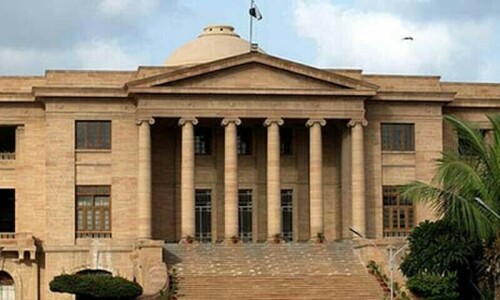
ISLAMABAD: The government’s apathy to conserve environment is evident from the fact that none of the environment protection tribunals is operational across the country, Dawn has learnt from sources in the newly-formed Ministry of National Disaster Management.
The tribunals became non-functional after it missed representatives - member technical in some provinces - while in Punjab it is without chairman since June 2011.
According to sources in the ministry, the situation reflected insensitivity towards environmental concerns and their violations because the environment tribunal in Khyber Pakhtunkhwa was non-operational since January 2011, Balochistan since July 2011 and Sindh since July 2010.
“Last year, the Supreme Court had directed to ensure environment protection agencies were functioning and delivering when it learnt that EPAs in Sindh and Balochistan were non-functional,” said an official source, lamenting how everything had been thrown into the reverse gear.
The environment protection tribunals were formed under Section 20 of the Pakistan Environment Protection Act 1997.
The tribunals have the powers to give directions, act to override other laws and make regulations to mention some. It particularly dealt with violations of Sections 11 (National Environment Quality Standards) and 12 (Environment Impact Assessment) of the Environment Protection Act. These included development activities in all sectors whether industry, residential, commercial, municipal agency, utility services providers, communication and energy etc.
“Non-compliance in these sectors can result in environmental degradation whether they are small or mega development projects,” said the official source, giving examples of most housing societies including Defence Housing Authority (DHA) and the avenues in Islamabad that were constructed in violation of Section 12 of the Environment Act.
According to available data up till 2010 with the Ministry of National Disaster Management, there were nearly 140 cases pending with Pakistan Environmental Protection Agency (Pak-Epa), over 1,000 cases with Punjab EPA, as many as 119 in Khyber Pakhtunkhwa, 16 in Sindh, 13 in Balochistan and one in Gilgit-Baltistan.
Explaining how EPAs across the country worked, the official said these regulators issued environment protection orders to violators for non-compliance with the laws.
“And since EPAs cannot impose penalties and punishments, the cases are referred to the tribunals which then initiate legal proceedings against the violators,” said the source.
However, Director General Pak-Epa Asif Shuja explained that after devolution the provinces were to form their own EPAs.
Dismissing the argument that all EPAs across the country were non-operational, Mr Shuja said the regulatory bodies could function as long as there were two members minimum.
“In KP, the member technical has been given additional charge of the chairman. Balochistan is missing its member technical but still functional. Sindh EPA is also operational,” he added.
Nonetheless, the Ministry of National Disaster Management that was taking up the matter in writing asserted otherwise.













































Dear visitor, the comments section is undergoing an overhaul and will return soon.